THE EUCHARIST
A BIBLE STUDY GUIDE FOR CATHOLICS
FR. MITCH PACWA, S.J.
Our Sunday Visitor Publishing Division
Our Sunday Visitor, Inc.
Huntington, Indiana 46750
Nihil Obstat
Msgr. Michael Heintz, Ph.D.
Censor Librorum
Imprimatur
 Kevin C. Rhoades
Kevin C. Rhoades
Bishop of Fort Wayne-South Bend
November 19, 2012
The Nihil Obstat and Imprimatur are official declarations that a book is free from doctrinal or moral error. It is not implied that those who have granted the Nihil Obstat and Imprimatur agree with the contents, opinions, or statements expressed.
Every reasonable effort has been made to determine copyright holders of excerpted materials and to secure permissions as needed. If any copyrighted materials have been inadvertently used in this work without proper credit being given in one form or another, please notify Our Sunday Visitor in writing so that future printings of this work may be corrected accordingly.
Copyright 2013 by Mitch Pacwa, S.J. Published 2013.
18 17 16 15 14 13 1 2 3 4 5 6 7 8 9
All rights reserved. With the exception of short excerpts for critical reviews, no part of this work may be reproduced or transmitted in any form or by any means whatsoever without permission in writing from the publisher. Contact: Our Sunday Visitor Publishing Division, Our Sunday Visitor, Inc., 200 Noll Plaza, Huntington, IN 46750; 1-800-348-2440; .
ISBN: 978-1-61278-670-4 (Inventory No. T1375)
eISBN: 978-1-61278-306-2
LCCN: 2012953420
Cover design: Lindsey Riesen
Cover art: The Crosiers
Interior design: Sherri L. Hoffman
Interior art: iStockPhoto.com
PRINTED IN THE UNITED STATES OF AMERICA
To Neil Fisher for his eightieth birthday,
to his wonderful wife, Gaelyn,
son Ben and his wife, Amy,
and son Matthew and his wife, Kerian,
in gratitude for the many years
they have invited me to their ranch to hunt.
These times of quiet and relaxation have been filled with
their warmth, friendship, and commitment to our Catholic faith.
I appreciate everything they have taught me
through introducing me to my favorite sport.
CONTENTS
HOW TO USE THIS STUDY GUIDE IN A GROUP
This is an interactive study guide. It can be read with profit either alone or as part of a group Bible study. Below are suggestions for the use of this book in a group.
WHAT YOU WILL NEED FOR EVERY SESSION
This study guide
A Bible
A notebook
Before and to complete all the exercises in both. They should bring this study guide with them to the group session.
Begin the session with prayer (for example, Prayer Before Study, on page 112).
Invite one person in the group to read one of the Scripture passages included in this sessions material.
Allow five minutes of silent reflection on the passage. This allows the group to quiet their inner thoughts and to center themselves on the lesson to be discussed.
Catechesis: Give all members a chance to share some point that they have learned about the Eucharist. Was this something new or a new insight into something? Was there anything that raised a question? (Allow fifteen to twenty minutes for this.)
Discussion: Use the discussion questions at the end of the session chapter to begin a deeper grasp of the material covered in the session. (Allow fifteen to twenty minutes for this).
Conclusion: Have all members of the group summarize the key concepts they learned about the Eucharist discussed in the session. Assign the next session as homework, to be completed before the next group session.
SYMBOLS USED IN THIS STUDY GUIDE

| = | Information |

| = | Stop and Read |

| = | Investigate |

| = | Quotation |
ACKNOWLEDGMENTS
Unless otherwise noted, the Scripture citations used in this work are taken from the Catholic Edition of the Revised Standard Version of the Bible (RSV), copyright 1965, 1966 by the Division of Christian Education of the National Council of the Churches of Christ in the United States of America. Used by permission. All rights reserved.
Quotations from papal statements, Vatican II, and other Vatican documents are copyrighted, 2013, Libreria Editrice Vaticana.
Excerpts from the English translation of The Roman Missal 2010, International Commission on English in the Liturgy Corporation (ICEL). The English translation of the Gloria, the Nicene Creed, and the Agnus Dei is by the International Consultation on English Texts (ICET).
INTRODUCTION

The Eucharist makes constantly present the Risen Christ who continues to give himself to us, calling us to participate in the banquet of his Body and his Blood. From full communion with him flows every other element of the Churchs life: first of all, communion among all the faithful, the commitment to proclaiming and witnessing to the Gospel, the ardor of love for all, especially the poorest and lowliest.
Pope Benedict XVI,
First Message (April 20, 2005)
The Old Testament is very much part of Christian Scripture. In the Nicene Creed, we proclaim that the Holy Spirit has spoken through the prophets, and we see that the New Testament quotes from the Old 360 times, in order to show how Jesus fulfills the prophecies. Jesus himself explained to the disciples on the way to Emmaus, O foolish men, and slow of heart to believe all that the prophets have spoken! Was it not necessary that the Christ should suffer these things and enter into his glory? (Lk 24:25-26). Later that night, he told the assembled disciples, as he opened their minds to understand the scriptures: Thus it is written, that the Christ should suffer and on the third day rise from the dead (Lk 24:45-46). Therefore we do well to go to the Old Testament to better understand Christs life in the context of the Judaism that he knew and lived.
CONSIDER
In this book, we want to examine Jesus teaching and actions concerning the Eucharist, as found in the New Testament and as illumined by the Old Testament and Jewish practice. This will include ).
In the Old Testament, sacrifices were offered by the Levitical priests; in the New Testament, Jesus is the one, true, and eternal high priest according to the order of Melchizedek. We will look at the role of the Old Testament high priest in his primary function in the sacrifices on Yom Kippur, the Day of Atonement (), as bookends for this study of the biblical roots of the Eucharist.
May this help us all to grow in faith and understanding of Christs saving work in the Eucharist so that we can participate in it more richly and live it out in daily life. As Pope Benedict says, I encourage all of you to discover ever more fully in the Eucharist, the sacrament of Christs sacrificial love, the inspiration and strength needed to work ever more generously for the spread of Gods Kingdom and the growth of the civilization of love (cf.
Next page

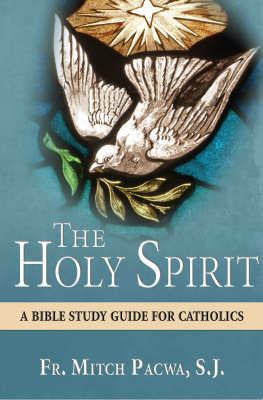
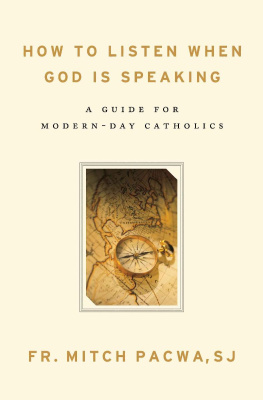
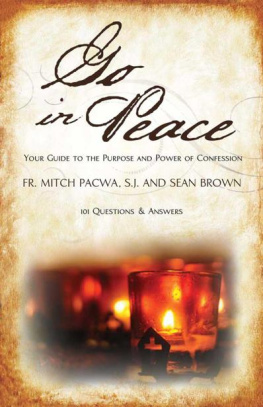
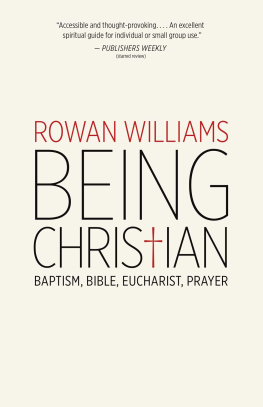
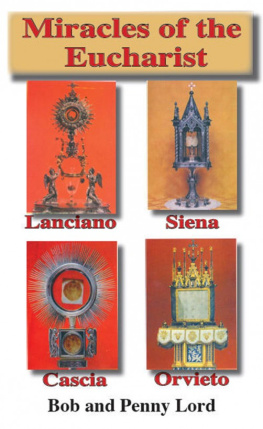
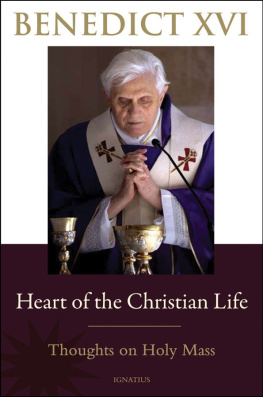
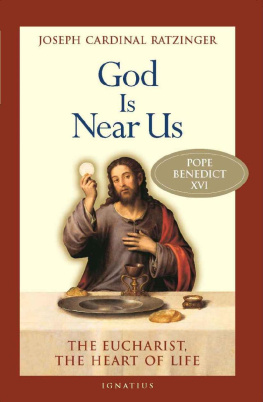
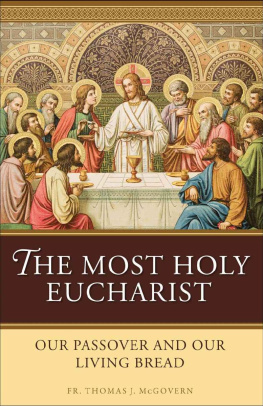
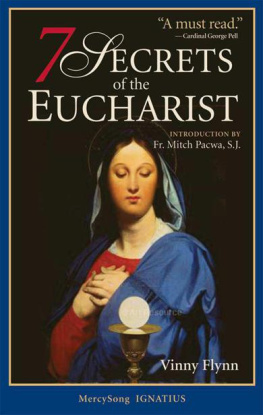
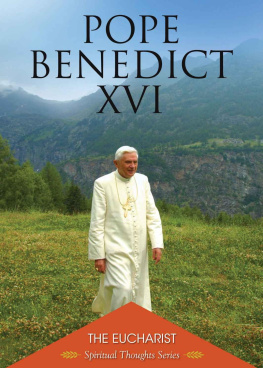
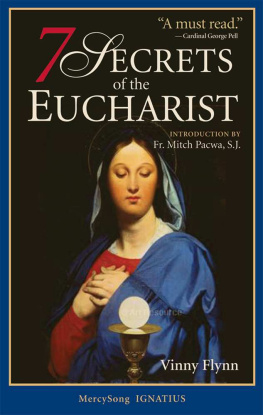
 Kevin C. Rhoades
Kevin C. Rhoades



